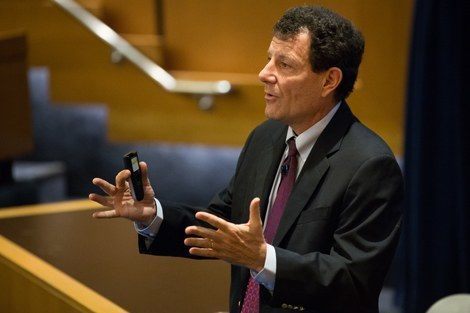October 7, 2014 — In 2010, New York Times journalists Nicholas Kristof and his wife, Sheryl WuDunn, argued for investing in the health, education, and autonomy of women around the world in their book Half the Sky: Turning Oppression into Opportunity for Women Worldwide.
After the book came out, people were always asking them: What can we do?
“We wanted to give people a sense that, even though the problems are vast, they shouldn’t feel hopeless and overwhelmed—that there are things they can do,” said Kristof.
So the two wrote another book—A Path Appears: Transforming Lives, Creating Opportunity, released on September 23—that serves as a sort of “how-to” guide for how ordinary people can help cure the many ills of the world.
Kristof spoke to a packed audience at Harvard School of Public Health’s Snyder Auditorium on October 1, 2014, and signed books afterwards, at an event sponsored by the School’s Center for Health Communication.
Making an impact
In introducing Kristof, Center Director Jay Winsten cited his “passion to have impact and to improve the lives of those who are the least well off.” Kristof and WuDunn won a Pulitzer Prize in 1990 for their coverage of the Chinese pro-democracy movement and protests in Tianenman Square in 1989 and Kristof won a second Pulitzer in 2006 for his New York Times columns on genocide in Darfur.
Kristof related a story from A Path Appears about a young Seattle girl named Rachel Beckwith. For her 9th birthday, Rachel decided to sponsor a birthday fundraising page on the website of Charity: Water, a nonprofit aimed at providing safe and clean drinking water for people around the world. Rachel’s goal was $300, but she fell short, raising only $220.
Then Rachel was critically injured in a car accident. “People in her community felt helpless, they wanted to figure out some way of showing support for Rachel and her family, and they began donating on her birthday page,” said Kristof. Tragically, Rachel died from her injuries. But the donations to her birthday page soared; people gave $1.2 million, providing clean water for more than 37,000 people. Today, said Kristof, there are wells in parts of Ethiopia with markers bearing Rachel’s name.
Improving children’s health
There are other ways people can help, Kristof said. For instance, helping children early in life is key to ensuring that they grow up to be healthy, productive adults, he said. Breastfeeding, for example, could have a huge impact. “People delay nursing because they think colostrum is bad for the baby, or they give the baby water on a hot day and the water is from a puddle somewhere, or they give the baby solid foods too early,” Kristof explained. “But estimates are that about 600,000 infants’ lives could be saved each year if there was optimal breastfeeding.”
Kristof also highlighted the work of David Olds, who, as a young scholar in the 1970s, developed a program called Nurse-Family Partnership that showed that parent coaching can have far-reaching impact. The program offered support to low-income, at-risk mothers, from the time they were pregnant to when their children were age 2. The mothers were encouraged to hold off on alcohol, drugs and smoking; to talk and read to their children; to avoid lead exposure in their children’s environment—“to do a lot of things that are more intuitive in a middle-class household, and easier when you have more resources,” Kristof said. The program has had “outstanding effects,” he noted, such as dramatically reducing the children’s risk of suffering abuse or winding up in prison when they get older.
photo: Emily Cuccarese
